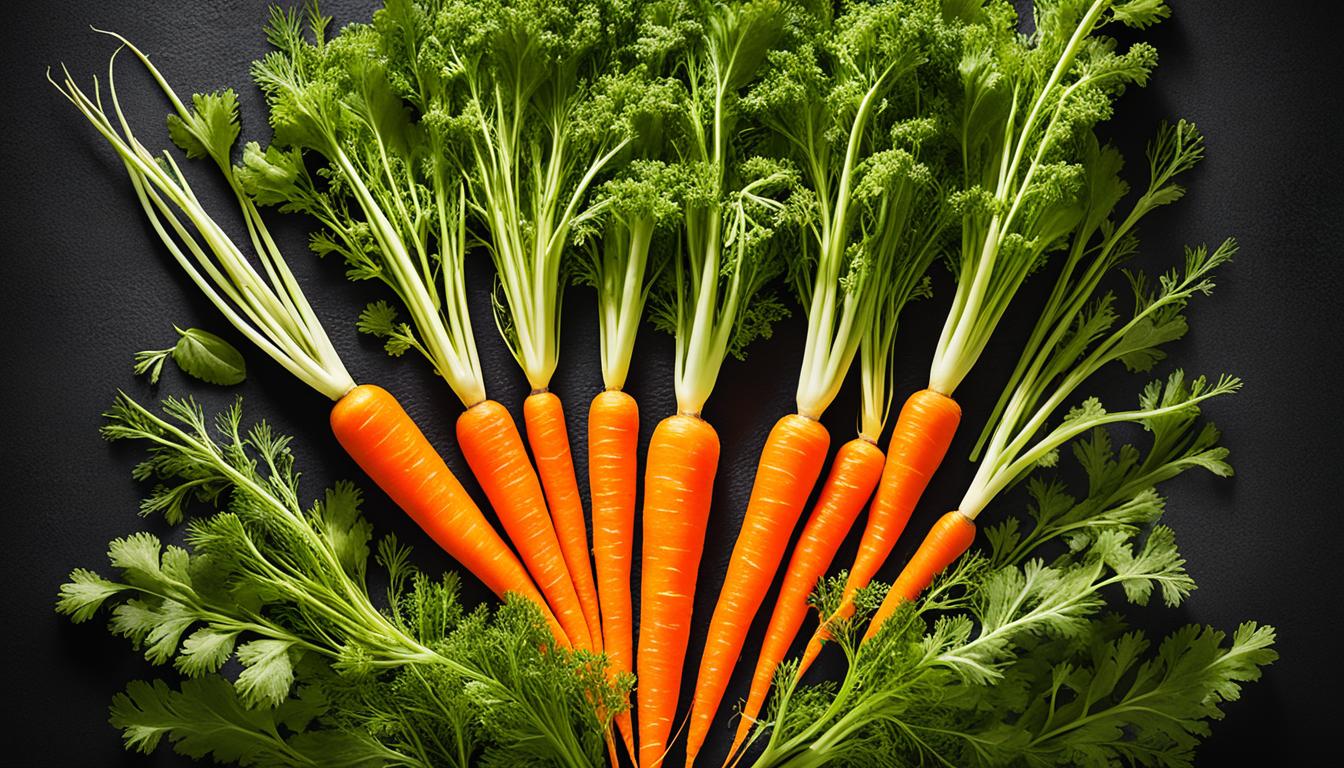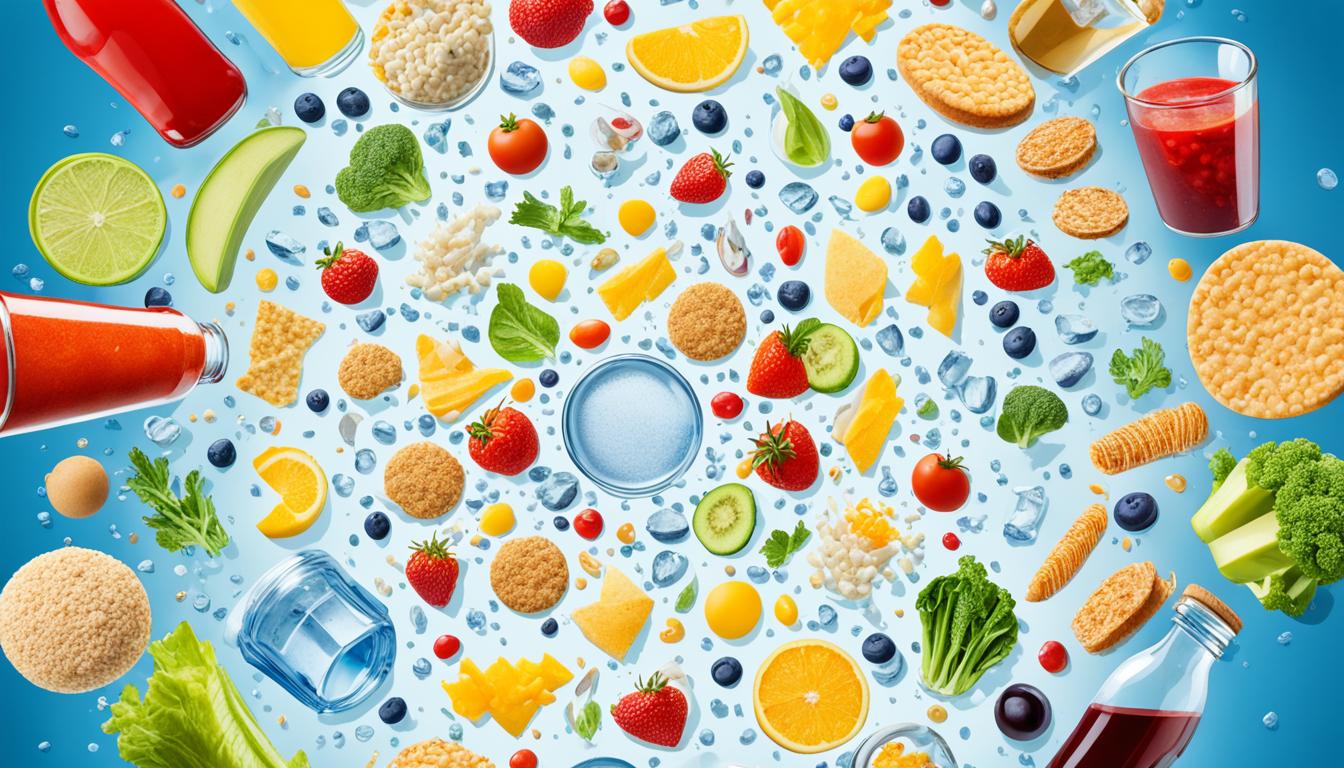One medium carrot gives you up to 73% of the daily vitamin A you need. This shows how nutritious carrots really are. They’re full of necessary vitamins, minerals, and antioxidants. We’ll look into carrot nutrition facts and how eating them can boost your health.
Carrots contain a lot of good nutrients like beta-carotene, fiber, and vitamin K1. They also have potassium and antioxidants. These substances help eyesight, lower cancer chances, and improve digestion. Carrots are also good for diabetics and keep your heart healthy because of their carbs, fiber, and low glycemic index.
Learning about the rich nutrition in carrots helps us choose better foods. Carrots do more than help you see better and lower bad cholesterol. They bring many health benefits to your table every day.
Key Takeaways
- Carrots are packed with essential vitamins, minerals, and antioxidants that can provide numerous health benefits.
- Carrots contain a wealth of nutrients, including beta-carotene, fiber, vitamin K1, potassium, and various antioxidants.
- Carrots have been linked to improved eye health, reduced cancer risk, and better digestive function.
- The carbohydrates, fiber, and low glycemic index of carrots make them a great choice for managing diabetes and supporting cardiovascular health.
- Understanding the impressive nutrition profile of carrots can help readers make informed choices to optimize their health through a balanced, carrot-inclusive diet.
What Are Carrots?
Carrots are a kind of root vegetable that started in Afghanistan about 1,100 years ago. Most people know and love orange carrots the best. But, carrots can also be purple, yellow, red, and white.
The orange ones we eat now were made in Central Europe in the 1400s or 1500s. Back then, carrots were often purple or yellow.
Origins and History
In about 900 AD, the first carrots grew in Afghanistan. The orange ones we eat a lot came later, in the 1400s or 1500s, in Central Europe. The early carrots were not orange like ours. They were often purple or yellow.
Varieties of Carrots
Carrots vary in their shape, color, and how long they grow. There are many types. For example, Imperator carrots are long and taper at the end. Nantes carrots are medium, with a soft tip. Danvers carrots are big and medium in size. Chantenay carrots are short, but have a wide top. Purple carrots are another kind, adding color with their health-boosting anthocyanins. Also, there are rainbow carrots, a colorful mix of different types.
Nutritional Value of Carrots
Macronutrients in Carrots
Carrots are packed with water and carbs, but have little fat and protein. They’re full of good types of sugars like sucrose and glucose. Plus, a medium carrot has almost 2 grams of fiber.
For people watching their blood sugar, carrots are a top pick. Their low glycemic index helps keep sugar levels steady, which is great for folks with diabetes.
Micronutrients in Carrots
Carrots are rich in key vitamins and minerals. They’re a powerhouse of vitamin A, thanks to beta-carotene. Vitamin A is crucial for good vision and a strong immune system.
That’s not all. Carrots also have antioxidants called carotenoids. These compounds help fight off heart disease and cancer.
| Nutrient | Amount per 100g of Raw Carrots | Percent of Daily Value |
|---|---|---|
| Calories | 41 | – |
| Water | 88g | – |
| Protein | 0.8g | – |
| Carbohydrates | 9.0g | – |
| Fiber | 2.7g | 10% |
| Fat | 0.1g | – |
| Vitamin A | 835 mcg | 93% |
| Vitamin K1 | 13 mcg | 16% |
| Vitamin C | 5.9 mg | 8% |
| Potassium | 320 mg | 7% |
Carrots Nutrition Facts
Vitamins and Minerals in Carrots
A medium-sized raw carrot (61 g) gives you lots of vitamins and minerals. It has 509 mcg of vitamin A, which is 56% of what you need daily. You’ll also get 195 mg of potassium (4% daily value), 20.1 mg of calcium (2% daily value), and 3.6 mg of vitamin C (4% daily value). Carrots also provide vitamin K1, folate, and vitamin E.
Fiber Content in Carrots
Carrots are packed with fiber. One medium carrot has 1.7 g of fiber. This is 5-7.6% of the fiber you should eat each day. Carrots have both soluble and insoluble fiber. Soluble fiber like pectin can lower blood sugar and cholesterol. Insoluble fiber, including cellulose, hemicellulose, and lignin, helps keep your digestive system healthy and aids in regular bowel movements.
Antioxidants and Plant Compounds in Carrots
Carrots are packed with antioxidants, like beta-carotene, alpha-carotene, and lutein. These help boost your immune system and lower the risk of cancer. They are especially good for your eyes. Beta-carotene turns into vitamin A in your body, helping with vision.
It’s good to eat carrots with a little fat. This makes it easier for your body to absorb the carotenoids in them.
Carotenoids in Carrots
Carotenoids are plentiful in carrots, with a wide variety available. For every 100 grams of carrots, you’ll find between 6,000 to 54,800 μg of carotenoids. This includes large amounts of beta-carotene, which is known for boosting your immune system and keeping diseases at bay.
Some studies even suggest that beta-carotene can help prevent Alzheimer’s.
Other Beneficial Plant Compounds
Carrots also have polyacetylenes and anthocyanins. These help fight cancer and offer protection as strong antioxidants. They contain lycopene too, which could lower the chances of heart disease and prostate cancer.
The main perk of eating carrots is their high carotenoid content. This includes beta-carotene. As antioxidants, they ward off free radicals. This can help lower the risk of diseases, such as heart disease and cancer.
Health Benefits of Eating Carrots
Promoting Eye Health
Carrots are great for your eyes because they have lots of vitamin A and carotenoids. These nutrients, like lutein and zeaxanthin, keep your eyes healthy. They may also stop age-related macular degeneration, which can make you lose your vision.
But, carrots won’t fix your vision if you don’t have a vitamin A problem. They’re just one part of a diet that keeps your eyes in good shape.
Reducing Cancer Risk
The carotenoids and other good stuff in carrots are antioxidants. They help lower the chances of getting cancer in the prostate, colon, and stomach. Eating lots of carotenoids can protect you from some cancers. And, studies show women with more carotenoids in their blood may get less breast cancer.
Supporting Digestive Health
Fiber in carrots is good for your digestion. It keeps things moving and lowers the risk of getting constipated. The type of fiber called pectin is also great because it helps the good bacteria in your gut. This leads to better digestion and less chance of gut problems.
Carrots and Diabetes Management
Carrots are great for those with diabetes because they’re not starchy. They have a low glycemic index and load, especially in their raw form. This makes them excellent for keeping blood sugar in check and lowering the risk of type 2 diabetes. A medium carrot holds just 4 net carbs. Also, their glycemic index is below 55, showing they don’t spike blood sugar much.
Fiber in carrots helps too. It can keep blood sugar steady and is good for metabolic health if you have diabetes or are at risk. A recent study found that eating enough fiber can cut your chances of getting type 2 diabetes. It can also help lower blood sugar in those who already have it.
The ADA and EASD say that treating high blood sugar should fit each person. They think that including low-carb foods like carrots in your diet could significantly lower your HbA1c levels.
Carrots are among the veggies recommended for diabetics. Others include broccoli, zucchini, and peppers. The NIH teaches that people with diabetes should eat a mix of vegetables, fruits, grains, proteins, and low-fat dairy. They believe carrots fit well into this healthy approach.
If you have diabetes, getting help from a nutritionist is a smart move. They can offer personalized advice on including carrots and other healthy foods in your diet. This can help you manage your blood sugar well and stay healthy.
Cardiovascular Benefits of Carrots
Carrots are high in potassium, which keeps our blood pressure in check. Eating potassium-rich foods, like carrots, fights the effects of sodium. This can lead to lower blood pressure. Moreover, carrots have fiber and antioxidants. These help lower cholesterol and cut the risk of heart disease.
Lowering Blood Pressure
Carrots provide a good dose of potassium, vital for managing blood pressure. They counterbalance sodium’s impact, helping keep blood pressure down.
Improving Cholesterol Levels
Add carrots to your meals to likely see a drop in bad cholesterol. Their fiber keeps the body from absorbing too much cholesterol. This lowers overall cholesterol levels. As a result, the risk of heart problems goes down.
Boosting Immune Function with Carrots
Carrots are packed with nutrients that help our immune system. They contain vitamin C, vitamin A, and many antioxidants. Vitamin C keeps our immune system strong, protecting us from getting sick. Eating carrots can help our immune system work better and fight off diseases.
A medium carrot has 3.6mg of vitamin C, essential for our immune system. Vitamin A in carrots helps with immunity, as shown in early studies. Carrots also have carotenoids like lutein and zeaxanthin, which might reduce cancer risk.
Adding carrots to your diet can make your immune system stronger. It can also help you be healthier overall.
Supporting Bone Health with Carrots
Carrots give us a bit of calcium, phosphorus, and vitamin K1, which are good for our bones. These nutrients help build and keep bones strong. Vitamin K1 also helps our bones stay healthy. It fights against bone issues like osteoporosis. Plus, the vitamin C in carrots helps our body make collagen. Collagen is very important for our bones.
Preparing and Storing Carrots
Carrots are delicious both raw and cooked. You can eat them as a crispy snack, in salads, or as a side dish. Boiling or steaming keeps more nutrients than frying them. Roasting carrots makes them sweeter and tastier.
Cooking Methods for Carrots
Carrots work in lots of recipes. They can add crunch to salads or be cooked for a softer texture. Steaming or boiling keeps them nutritious. Roasting carrots brings out their sweet, caramelized taste.
Storing Fresh Carrots
Keep carrots fresh by storing them in a sealed plastic bag in the fridge. Take off the green tops before storing. This stops the tops from taking the carrot’s nutrients. Fresh carrots last about 2 weeks this way.
Conclusion
Carrots are a top-notch root vegetable bursting with nutrients like vitamins, minerals, and antioxidants. They help keep our eyes healthy, lower cancer risk, and support our heart and gut. Adding carrots to meals can significantly boost our health. They can be eaten raw, cooked, or added to various dishes. Carrots are not only healthy but also tasty, making them a smart pick for better well-being.
Carrots come with a host of benefits thanks to their low glycemic index, rich fiber, and key nutrients such as vitamins A and C, and potassium. These nutrients are great for our health. Carrots’ antioxidant powers, especially from carotenoids, help lower the likelihood of getting sick. This makes them a perfect option for anyone looking to improve their general health.
Carrots are simple to find and budget-friendly. They fit well in all sorts of recipes, from snacks to main dishes. By eating carrots often, you grab hold of their rich nutritional value. This choice moves you closer to a healthier lifestyle.
FAQ
What are the key nutrients found in carrots?
How do the different varieties of carrots differ?
What are the main macronutrients and micronutrients in carrots?
How much fiber do carrots contain?
What are the key antioxidants and plant compounds found in carrots?
How can carrots support eye health?
Can carrots help reduce the risk of certain cancers?
How can carrots benefit digestive health?
Are carrots a good choice for individuals with diabetes?
How can carrots support cardiovascular health?
How can carrots boost the immune system?
How can carrots support bone health?
What are the best ways to prepare and store carrots?
Source Links
- https://www.healthline.com/nutrition/foods/carrots
- https://www.webmd.com/food-recipes/benefits-carrots
- https://www.verywellfit.com/calories-in-carrots-3495643
- https://www.ncbi.nlm.nih.gov/pmc/articles/PMC3550877/
- https://www.ncbi.nlm.nih.gov/pmc/articles/PMC6770766/
- https://www.healthline.com/health/diabetes/can-diabetics-eat-carrots
- https://www.medicalnewstoday.com/articles/are-carrots-good-for-diabetics
- https://www.medicalnewstoday.com/articles/270191
- https://extension.usu.edu/nutrition/research/carrots




